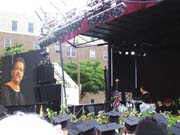To most people it might seem like there’s a world of difference between the young graduates from the Stevens Institute of Technology and Dr. Leonel Fernández, the president-elect of the Dominican Republic. But geographic and cultural divides aside, there is one very striking similarity – both have the conviction that technology will be a key component of their future success.
The commencement address for the undergraduate ceremony at Stevens was delivered Thursday morning by Fernández, who was democratically elected on May 16 and will take office in his country on August 16. Fernández was president from 1996 to 2000 and also received an honorary doctorate at the Stevens graduation ceremony.
Since being elected, Fernández, who was born in Santo Domingo but spent much of his childhood in the Bronx, has been in the U.S. meeting with business leaders and courting foreign investors in hopes of pulling his country out of the worst economic crisis in several decades.
In an elegant speech, Fernández said that technology and innovation are the solutions to many of his country’s ills. He said that graduates from universities such as Stevens will bring the technical knowledge that will aid developing countries in their “leap into the 21st century.”
“Even though the Dominican Republic has made great progress in the last 30 years,” Fernandez said, “there is still much poverty and social inequity. Technology is the key driving force of economic development. It’s what will close the gap between those who have and those who have not.”
Fernández is also the chair and president of the Dominican Liberation Party and the Global Foundation for Democracy and Development. Through this organization, Fernández contributes to the development of the Dominican Republic and the Latin American region.
The nonprofit institution was established to analyze vital national interests, propose strategic plans to enhance the quality of the national debate, and improve the level of training and education in the country.
He praised Stevens for its commitment to economic development in Latin America and the Caribbean. At the Stevens Chemical Ecology Laboratory at Punta Cana, in the Dominican Republic, researchers are engaged in profiling the intricate chemical mechanisms insects use to communicate and ward off disease. This program, called “Drugs From Bugs,” makes use of the great biodiversity of the Dominican Republic as it explores possibilities for new pharmaceuticals.
In recent years, the Stevens Institute of Technology has made inroads globally, starting programs, conducting research, or training teachers in places such as Punta Cana as well as Beijing, China; Saudi Arabia; Northern Ireland; Lima, Peru; Guayaquil, Ecuador; and San Jose, Costa Rica.
The second keynote speaker was Theodore W. Kheel, who is one of America’s most distinguished professional mediators and one of New York City’s most influential public advocates. An esteemed lawyer and professional arbitrator, he has participated in the resolution of more than 30,000 labor disputes. Personal financial contributions from Kheel have helped fund Stevens Chemical Ecology Laboratory in the Dominican Republic.
350 graduates
Approximately 350 undergraduates walked across the stage at Stevens Thursday morning to claim their diplomas at the school’s 132nd commencement exercises. In past years, Stevens has held its commencement inside the university’s Schaefer Athletic Center, but according to university officials, the school has outgrown that facility. This year a professional outdoor stage with a large video screen and seating areas were installed at the corner of Eighth Street and Castle Point Terrace.
According to Stevens officials, moving the on-campus ceremonies outdoors allowed more than 3,500 people, about 1,000 more than in the past, to attend the ceremony so they could cheer on their sons and daughters as they shook the hand of school President Hal Raveche, signaling the transformation from student to graduate.
“We’re here today to celebrate this most accomplished group,” said Raveche to the crowd. “You have both our respect and admiration.”
Graduates Allison Rachael Donnelly and David Yuppa were honored as “first in the class” for achieving the highest grade point averages in the undergraduate class of 2004.
,br> Established in 1870, Stevens offers baccalaureate, masters and doctoral degrees in engineering, science, computer science, management and technology management, as well as a baccalaureate in the humanities and liberal arts. The university has a total enrollment of about 1,600 undergraduates and 2,600 graduate students.
